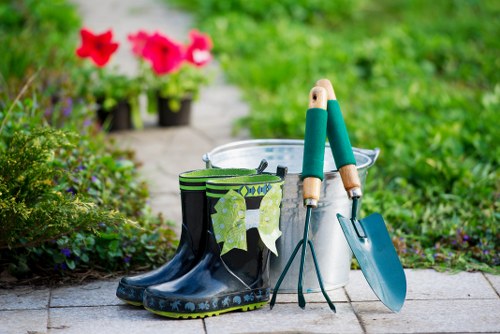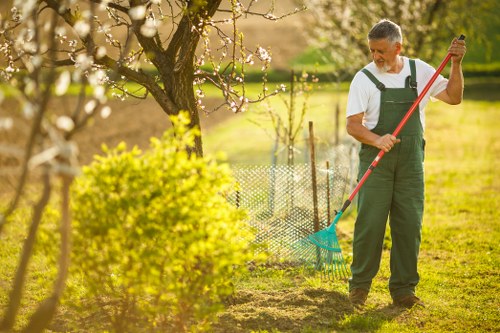Garden Fence Installation East London

Transforming your garden into a secure and beautiful space begins with a well-installed fence. In East London, garden fence installation is a popular choice among homeowners looking to enhance privacy, security, and aesthetics. Whether you're aiming to create a tranquil retreat or define your outdoor space, understanding the key aspects of fence installation is essential.
East London offers a diverse range of garden styles and needs. From traditional backyards to modern urban gardens, the right fence can make a significant difference. This comprehensive guide explores everything you need to know about garden fence installation in East London, ensuring you make informed decisions for your property.
Choosing the right fence involves considering materials, design, functionality, and local regulations. East London homeowners have access to various fencing options, each with its unique benefits. Let's delve into the factors that make garden fence installation in East London both feasible and advantageous.

Why Install a Garden Fence?
Installing a garden fence offers numerous benefits that go beyond mere aesthetics. Here are some compelling reasons to consider a fence for your East London garden:
- Privacy: A fence provides a barrier, ensuring your garden remains a private sanctuary.
- Security: It deters unwanted visitors and protects your property from intruders.
- Definition: A fence clearly defines the boundaries of your garden, adding structure to your outdoor space.
- Aesthetic Appeal: A well-designed fence enhances the visual appeal of your home and garden.
- Safety: It keeps children and pets safely within the garden area.
In East London, where space can be limited, maximizing the use of your garden with a fence is both practical and stylish.
Moreover, garden fences can increase the value of your property. Potential buyers often view a well-maintained garden with a sturdy fence as an attractive feature, making it a worthwhile investment.

Choosing the Right Fence Material
The material of your garden fence plays a crucial role in its durability, maintenance, and appearance. East London homeowners have access to a variety of fencing materials, each suited to different needs and preferences.
Wooden Fences
Wooden fences are a classic choice, offering a natural and warm aesthetic. They can be customized in various styles, such as picket, lattice, or panel designs.
- Pros: Versatile, aesthetic appeal, customizable.
- Cons: Requires regular maintenance, susceptible to weather damage.
In East London's climate, wooden fences need protection against moisture and pests. Regular staining or painting can prolong their lifespan.
Metal Fences
Metal fences, including iron, aluminum, and steel, are known for their strength and longevity. They offer a sleek and modern look, suitable for contemporary gardens.
- Pros: Durable, low maintenance, secure.
- Cons: Can be more expensive, susceptible to rust if not properly treated.
Vinyl Fences
Vinyl fences are a low-maintenance alternative to wood and metal. They come in various colors and styles, mimicking the appearance of traditional materials without the associated upkeep.
- Pros: Resistant to weather, easy to clean, long-lasting.
- Cons: Limited color options, can crack in extreme temperatures.
Composite Fences
Composite fences combine materials like wood fibers and plastic, offering the look of wood with enhanced durability. They are environmentally friendly and require minimal maintenance.
- Pros: Eco-friendly, durable, low maintenance.
- Cons: Higher initial cost, limited style options.
Selecting the right material depends on your budget, desired appearance, and maintenance preferences. Consulting with local fence installation experts in East London can help you make the best choice for your garden.

Design and Style Considerations
The design of your garden fence should complement the overall style of your home and landscape. East London boasts a mix of architectural styles, from Victorian terraces to modern apartments, each requiring a tailored fencing solution.
Traditional Styles
For homes with classic or period features, wooden picket fences or wrought iron panels can enhance the traditional charm. These styles often feature decorative elements like scrolls, finials, and ornate panels.
Modern Designs
Contemporary gardens benefit from sleek lines and minimalist designs. Metal or composite fencing with clean finishes and geometric patterns can create a stylish and understated boundary.
Rustic and Natural
Rustic gardens pair well with natural materials like untreated timber or bamboo. These fences blend seamlessly with greenery, creating an organic and harmonious environment.
Functional Features
Consider integrating functional elements such as gates, trellises, or decorative panels. These additions not only enhance functionality but also add visual interest to your garden.
In East London, where gardens range from small urban spaces to larger suburban plots, selecting a design that fits your specific environment is key to successful fence installation.

Local Regulations and Permits
Before embarking on garden fence installation in East London, it's essential to be aware of local regulations and obtain necessary permits. These rules ensure that your fence complies with community standards and safety guidelines.
Planning Permission
While many garden fences fall under permitted development, certain heights, materials, or locations may require planning permission. Checking with the local council can prevent potential legal issues.
Boundary Agreements
If your garden borders a neighbor's property, it's advisable to discuss fence installation plans beforehand. Clear communication can prevent disputes and ensure mutual agreement on fence placement and design.
Height Restrictions
East London areas may have specific height restrictions for fences, especially near roads or shared boundaries. Adhering to these limits is crucial for compliance and community harmony.
Materials and Safety
Some materials may be restricted due to safety or aesthetic concerns. Ensuring your chosen material is permissible under local guidelines is a vital step in the installation process.
Engaging with a professional garden fence installer in East London can help navigate these regulations, ensuring a smooth and compliant installation experience.
Process of Garden Fence Installation
Understanding the garden fence installation process can help you prepare and ensure a successful outcome. Here's a step-by-step overview tailored for East London homeowners:
1. Planning and Design
- Assess your garden's layout and determine fence placement.
- Choose the appropriate material and style.
- Create a design plan considering aesthetics and functionality.
2. Obtaining Permits
- Consult local council regulations.
- Apply for necessary planning permissions.
- Inform neighbors if required.
3. Preparing the Site
- Mark the fence line.
- Clear the area of obstacles and debris.
- Ensure proper drainage and ground stability.
4. Installation
- Set fence posts at regular intervals.
- Ensure posts are level and securely anchored.
- Attach fence panels or materials.
5. Finishing Touches
- Add gates or additional features.
- Apply treatments if using wood.
- Inspect the fence for stability and finish.
Professional installers in East London typically handle all these steps efficiently, ensuring a high-quality finish that meets your garden's needs.
Cost Considerations
Budgeting for garden fence installation involves several factors. Understanding these can help you allocate resources effectively:
- Material Costs: Prices vary based on the chosen material, with wood and vinyl being generally more affordable than metal or composite options.
- Labor Charges: Professional installation fees depend on fence complexity, length, and local labor rates in East London.
- Permitting Fees: Obtaining necessary permits may incur additional costs.
- Maintenance Expenses: Consider long-term maintenance costs, especially for materials like wood that require regular upkeep.
Obtaining multiple quotes from reputable fence installers in East London can provide a clearer picture of expected expenses, helping you make informed financial decisions.
Maintenance Tips for Your Garden Fence
Proper maintenance extends the lifespan of your garden fence and keeps it looking its best. Here are some maintenance tips tailored to different fence materials:
Wooden Fences
- Regularly inspect for signs of rot or damage.
- Reapply stains or sealants every few years.
- Clean the surface to prevent mold and mildew.
Metal Fences
- Check for rust and treat promptly.
- Clean with mild detergents to remove dirt and debris.
- Ensure all bolts and screws are tight.
Vinyl Fences
- Wash with soap and water to maintain cleanliness.
- Inspect for cracks or damage after storms.
- Avoid using abrasive cleaners that can scratch the surface.
Composite Fences
- Clean periodically to remove dirt and stains.
- Check for any discoloration or damage.
- Follow manufacturer guidelines for maintenance.
Regular maintenance not only preserves the appearance of your fence but also ensures its structural integrity, providing lasting value to your East London garden.
Choosing a Professional Installer
Selecting the right professional for garden fence installation in East London is crucial for achieving desirable results. Consider the following when choosing an installer:
- Experience: Opt for installers with a proven track record in East London, familiar with local regulations and soil conditions.
- Reputation: Check reviews and testimonials to gauge customer satisfaction.
- Licensing and Insurance: Ensure the installer is properly licensed and insured to protect against potential liabilities.
- Portfolio: Review previous projects to assess the quality and style of their work.
- Quotes: Obtain detailed quotes to understand pricing and services included.
Engaging a reputable garden fence installer ensures a smooth installation process and a durable, attractive fence that meets your expectations.
Environmental Considerations
Eco-friendly fencing options are becoming increasingly popular in East London. Sustainable materials and practices contribute to environmental preservation while providing functional benefits:
Sustainable Materials
- Recycled Metals: Using recycled steel or aluminum reduces waste and energy consumption.
- Composite Materials: Made from recycled wood fibers and plastics, composites offer durability with a lower environmental impact.
- Bamboo: A renewable resource, bamboo fencing is both strong and rapidly renewable.
Eco-Friendly Practices
- Proper disposal of old fencing materials.
- Using low-VOC paints and sealants.
- Incorporating living fences with plants that contribute to biodiversity.
Choosing environmentally responsible fencing options aligns with sustainable living practices, benefiting both your garden and the broader ecosystem.
Enhancing Your Garden with Fencing
A well-installed fence serves as a foundation for further garden enhancements. Here are ideas to maximize the potential of your fenced garden:
Climbing Plants and Trellises
Integrate climbing plants like ivy, roses, or clematis with trellises attached to your fence. This not only beautifies the space but also adds natural privacy and shade.
Outdoor Lighting
Incorporate solar or LED lighting into your fence design. Well-placed lights accentuate the fence's features and provide safety along pathways.
Decorative Elements
Add decorative panels, finials, or artistic touches that reflect your personal style and enhance the garden's character.
Functional Additions
Consider installing gates, tool storage, or seating areas integrated with the fence design for added functionality.
These enhancements complement your fence, creating a cohesive and inviting outdoor environment in your East London garden.
Local Suppliers and Resources
East London offers a range of local suppliers and resources for garden fence installation. Supporting local businesses ensures access to materials that suit the regional climate and styles.
- Garden Centers: Provide materials and design inspiration tailored to East London's gardening trends.
- Local Timber Yards: Supply a variety of wood types suitable for outdoor fencing.
- Metal Fabricators: Offer custom metal fencing solutions with local expertise.
- Online Suppliers: Deliver materials directly to your doorstep, with options for eco-friendly and specialized products.
Engaging with local suppliers ensures that your garden fence installation is supported by quality materials and knowledgeable professionals.
Ten Tips for a Successful Fence Installation
- Plan Ahead: Design your fence to align with your garden's layout and your long-term needs.
- Know the Regulations: Familiarize yourself with local building codes and obtain necessary permits.
- Choose Quality Materials: Invest in durable materials that withstand East London's climate.
- Hire Experienced Installers: Select professionals with a proven track record in fence installation.
- Set a Realistic Budget: Account for all costs, including materials, labor, and permits.
- Prepare the Site: Ensure the installation area is clear and stable.
- Communicate Clearly: Discuss your expectations and preferences with your installer.
- Inspect Regularly: Monitor the fence during installation for quality and adherence to plans.
- Maintain Your Fence: Follow maintenance guidelines to prolong the fence's lifespan.
- Enhance with Landscaping: Integrate plants and features to complement your fence and garden.
Following these tips can lead to a successful and satisfying garden fence installation, enhancing your East London home's outdoor appeal.
Ten Most Common Mistakes to Avoid
- Poor Planning: Skipping the design phase can lead to functional and aesthetic issues.
- Ignoring Local Regulations: Failing to obtain permits can result in fines and forced removal.
- Choosing Inappropriate Materials: Selecting materials unsuitable for the local climate can reduce durability.
- Underestimating Costs: Not budgeting adequately can lead to incomplete projects.
- DIY Installations: Poorly installed fences may lack stability and appearance.
- Neglecting Maintenance: Failing to maintain the fence can accelerate wear and tear.
- Poor Communication: Misunderstandings with installers can result in unmet expectations.
- Overlooking Boundaries: Not accurately marking property lines can lead to disputes.
- Ignoring Aesthetics: A fence that doesn't match the home's style can detract from overall appeal.
- Not Considering Future Needs: Failing to anticipate changes can render the fence unsuitable over time.
Being aware of these common mistakes allows you to proactively address potential issues, ensuring a smooth garden fence installation in East London.
Local Areas for Garden Fence Installation Services
East London encompasses a variety of neighborhoods, each with unique characteristics and needs for garden fence installation. Here are some of the closest areas where professional fence installation services are readily available:
- Stratford: Known for its modern developments, ideal for contemporary fencing solutions.
- Ilford: Offers suburban homes requiring traditional and secure fencing options.
- Walthamstow: Features vibrant gardens, perfect for creative and decorative fences.
- Redbridge: Suburban landscapes benefit from durable and aesthetic fencing materials.
- Forest Gate: Urban settings demand space-efficient and stylish fencing designs.
- Wanstead: Historic areas may require fencing that complements period architecture.
- Bow: Community-focused neighborhoods seeking functional and attractive fencing solutions.
- Leyton: Diverse housing styles necessitate a range of fence materials and designs.
- Chingford: Larger gardens benefit from expansive and robust fencing installations.
- Hackney Wick: Artistic communities may prefer unique and customizable fencing options.
- Greenwich: Scenic gardens paired with elegant fencing enhance the area's charm.
- Nine Elms: Modern residences require sleek and durable fencing materials.
- Canary Wharf: High-rise gardens benefit from space-saving and secure fencing designs.
- Homerton: Family-friendly areas need secure and safe fencing solutions.
- Bowes Park: Peaceful neighborhoods look for fencing that offers both privacy and style.
Each area in East London has distinct features, making it essential to choose a fencing solution that aligns with local aesthetics and functional requirements.
Conclusion
Garden fence installation in East London is a valuable investment that enhances privacy, security, and the overall beauty of your outdoor space. By carefully selecting materials, adhering to local regulations, and choosing experienced installers, you can achieve a fence that meets your needs and complements your home.
With diverse options available, East London homeowners can find the perfect fencing solution to transform their gardens into inviting and secure retreats. Embrace the process, make informed choices, and enjoy the lasting benefits of a well-installed garden fence.
Frequently Asked Questions
1. How long does garden fence installation take in East London?
The duration of fence installation depends on factors like the fence's length, material, and complexity. On average, a standard garden fence can be installed within a few days to a week by professional installers.
2. Do I need planning permission for a garden fence in East London?
Many garden fences fall under permitted development, but certain heights or materials may require planning permission. It's advisable to check with your local council before proceeding.
3. What is the most durable fencing material for East London’s climate?
Metal fences, particularly those made from galvanized steel or aluminum, and composite materials are highly durable and suitable for East London's varying weather conditions.
4. Can I install a fence myself, or should I hire a professional?
While DIY installation is possible for the experienced, hiring a professional ensures precise installation, adherence to regulations, and a longer-lasting fence.
5. How much should I budget for garden fence installation in East London?
Costs vary based on material, fence length, and labor. On average, budgets can range from £50 to £150 per linear meter. Obtaining multiple quotes can provide a clearer estimate tailored to your specific project.